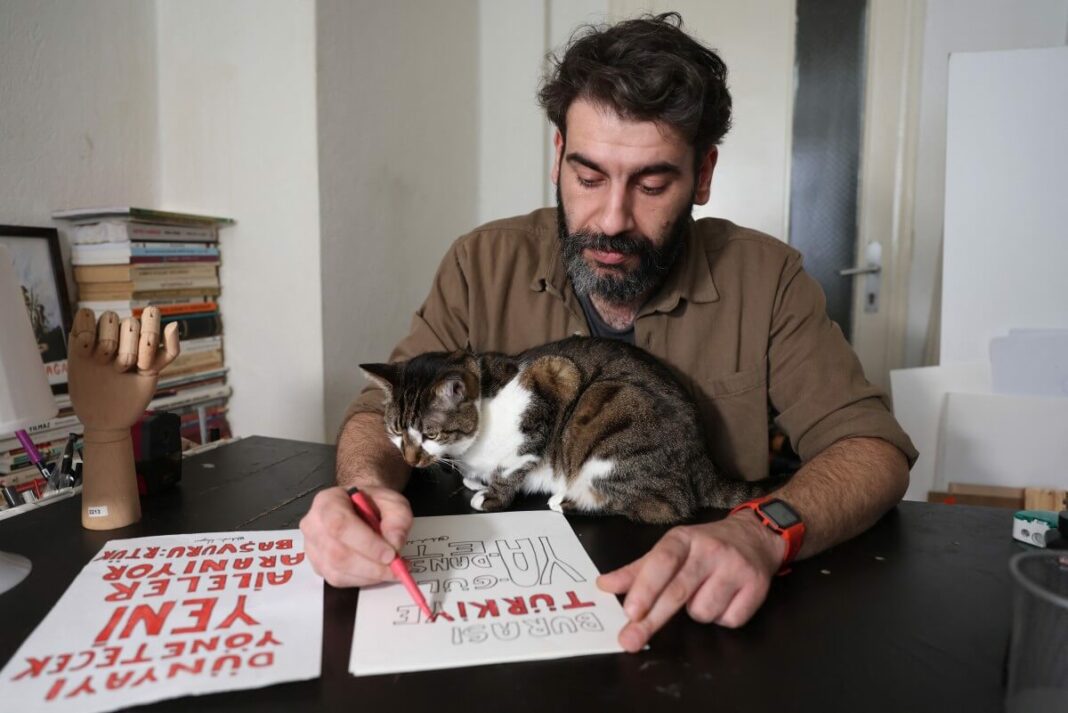A mock tombstone in the park designating the death of Turkish democracy. A poster on a lamppost suggesting people eat cake in the face of the national currency’s collapse.
The works of a Turkish street artist have become emblematic of the subversive forms of grassroots protest emerging against President Recep Tayyip Erdoğan’s two-decade rule.
The 34-year-old Hikmeti Tabiyeci — a pseudonym meaning “physicist” in Ottoman-era Turkish — draws inevitable comparisons to the British superstar Banksy.
But the Turkish artist operates in a far more ominous landscape.
Turkish musicians, filmmakers and authors have been prosecuted for rebelling against the policies of Erdoğan’s Islamic-rooted party, whose expanding influence covers much of the media, the education system and the courts.
“Even the most democratic gatherings are often prohibited,” Hikmeti Tabiyeci remarked in an interview with AFP in the capital of Ankara.
A former political activist, Hikmeti Tabiyeci shot to fame after leaving his career in advertising and devoting himself to art four years ago.
He chose the streets as his canvas, exhibiting works ranging from posters, paintings and installations to graffiti art, often tinting them with ironic humor.
“The streets are filled with trauma in Turkey’s political history,” he said.
“My uncle, whom I never knew, was killed just for putting up political posters in the run-up to the 1980 coup,” he said, referring to a particularly violent era in Turkish politics.
Landing strip for bees
Apart from a quiet, more democratic spell in the early 2000s, Turkish history has been paved with coup attempts, including a failed one in 2016 that Erdoğan responded to with a sweeping crackdown.
Hikmeti Tabiyeci does not exclusively focus on making political statements, often preferring to have mind-bending fun with his work.
“Most of them are just humorous, like when I draw a landing strip for bees in a park. But even for these, I receive hundreds of messages asking if I am not afraid of being arrested,” he said.
“This shows the extent of fear and repression. Even talking about fundamental rights such as the need to apply existing laws, to respect the environment or to say no to femicide has become political.”
This pressure came to a head after Turkey was rocked by two massive earthquakes one year ago that claimed more than 53,000 lives. Nearly 6,000 more died in neighboring Syria.
Erdoğan’s government came under intense fire over stories of survivors spending days trying to save their loved ones under the rubble, with no help from rescuers or the army in sight.
Erdoğan’s palace lights
Hikmeti Tabiyeci responded with a talismanic work depicting the silhouettes of three children, plunged in the darkness of a shattered city, looking out at the distant lights of Erdoğan’s sumptuous presidential palace.
He posted the picture on Instagram, where the “drawing went around the world,” he said.
“Newspapers published it in Europe and the United States. I received many messages of thanks, but I also suffered an online lynching. I was afraid of possible repercussions,” he said.
He never encountered legal problems, but ultimately abandoned plans to paint a similar fresco in Hatay — the province most ravaged by the disaster — for fear of harming his local partners.
Hikmeti Tabiyeci still produces works in the Syrian border region.
One is of an eye shedding a tear next to a play on words involving Hatay’s name, which can be used to imply making mistakes.
And he plans to return there in April, this time accompanied by a group of international artists.
“We will do a painting on a wall that is still standing. It will not be political. At least not directly,” he said with a smile.
© Agence France-Presse

